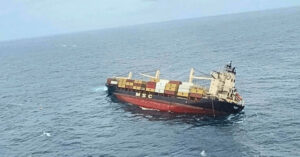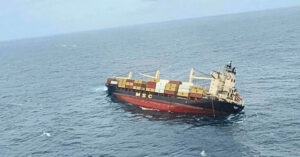
U.S. Conducts 20th Strike On Alleged Drug Boat In Caribbean, Killing Four
November 14, 2025
Over 50 Cruise Passengers Rescued After Catamaran Sinks In Samaná Bay
November 14, 2025

A newly released report by Greenpeace South Asia has raised concerns about the rising pollution of nurdles along Sri Lanka’s western and southern coastlines.
The study states that tiny plastic pellets, used worldwide to manufacture plastic products, are now accumulating along beaches from Negombo to Galle following two major ship accidents in the Indian Ocean.
The report, titled “Nurdle Pollution Along the Western and Southern Coastline of Sri Lanka Following Recent Ship Accidents,” is based on a survey done between 7 and 9 October 2025 across 16 beaches.
Researchers documented the extent of pollution linked to the 2021 MV X-Press Pearl disaster and the 2025 MSC Elsa 3 shipwreck off the coast of Kerala on 25 May 2025. Together, these incidents have released billions of plastic pellets into the Indian Ocean.
Nurdles were found at every beach surveyed, with levels ranging from low to extremely high. Most of the pellets were white and semi-translucent, which the study suggests are likely from the recent MSC Elsa 3 spill. Other pellets showed clear signs of ageing and weathering, indicating they may be remnants from the X-Press Pearl incident.
The survey team also spotted cylindrical, granule-like pellets mixed with other pellet types that appeared on beaches after the MSC Elsa 3 accident.
The report says monsoon-driven ocean currents likely carried pellets from the spill site off Kerala across the ocean to Sri Lanka. It notes that this pattern shows how seasonal circulation in the northern Indian Ocean affects the movement of nurdles.
Some of the surveyed beaches were located near sensitive ecosystems and fish landing areas, raising concerns about long-term ecological damage and socioeconomic disruptions for coastal communities.
The report calls for stronger national laws and enforcement systems to prevent nurdle pollution at every stage of the plastic pellet supply chain. It recommends that Sri Lanka update its rules to match or exceed international standards, including stricter handling and transport procedures and improved spill-recovery methods.
It also suggests making it compulsory to report any loss or spillage of plastic pellets at every stage of the global supply chain, to improve transparency and accountability.
The report suggests classifying plastic nurdles as a specific cargo category with its own safety rules, including clear requirements for packaging, labelling, and stowage during transport.
Additionally, the study urges the establishment of detailed procedures for rapid response, clean-up, restoration, and compensation after spills, following the “polluter pays” principle to ensure financial and legal accountability.
Reference: Greenpeace
Source: Maritime Shipping News


